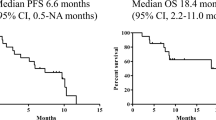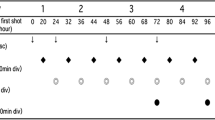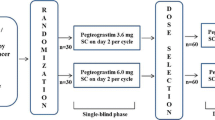Abstract
To assess the feasibility and efficacy of rhGM-CSF in ameliorating chemotherapy-induced leukopenia in patients with advanced non-small-cell lung cancer, we conducted a double-blind placebo controlled phase III study in a multicenter setting. Patients were eligible if they had cytologically or histologically proven cancer, no prior chemotherapy, stage IIIB or IV disease, an Eastern Cooperativve Oncology Group (ECOG) performance status of 0–2, an age of less than 76 years, and no symptomatic brain metastasis, disseminated bone metastasis, or previous vertebral/pelvic irradiation. The chemotherapy regimen consisted of mitomycin given at 8 mg/m2 on day 1, cisplatin given at 100 mg/m2 on day 1, and vindesine given at 3 mg/m2 i.v. on days 1 and 8 (MVP). If the granulocyte nadir count recorded after the first cycle of MVP was less than 1,000/mm3, patients were randomly assigned to receive recombinant human granulocyte-macrophage colonystimulating factor (rhGM-CSF) or placebo during the second cycle of MVP. The dose of rhGM-CSF was 125 μg/m2 given daily s.c. for 14 consecutive days starting on day 2. Of the 52 patients enrolled, 45 were evaluable. The nadir of granulocytes was significantly lower in the placebo group (P=0.007). The period during which the granulocyte count was less than 1,000/mm3 was significantly longer in the placebo group (median, 6 vs 10 days;P=0.04). The incidence of adverse effects related to rhGM-CSF, such as fever (≥38°C) and skin rash, was significantly higher in the rhGM-CSF group (P=0.011). The rate of response to chemotherapy did not significantly differ between the two groups. In conclusion, rhGM-CSF reduced the duration of chemotherapy-induced granulocytopenia. The clinical usefulness of this agent may be deminished because of the adverse effects encountered when it is used in combination with a moderately myelotoxic chemotherapy regimen.
Similar content being viewed by others
References
Bonomi PD, Finkelstein DM, Ruckdeschel JC, Blum RH, Green MD, Mason B, Hahn R, Tormey DC, Harris J, Comis R, Glick J (1989) Combination chemotherapy versus single agents followed by combination chemotherapy in stage IV non-small-cell lung cancer: a study of the Eastern Cooperative Oncology Group. J Clin Oncol 7: 1602–1613
Brugger W, Frisch J, Schulz G, Pressler K, Mertelsmann R, Kanz L (1992) Sequential administration of interleukin-3 and granulocyte-macrophage colony-stimulating factor following standarddose combination chemotherapy with etoposide, ifosfamide, and cisplatin. J Clin Oncol 10: 1452–1459
Bunn PA, Crowley J, Hazuka M (1991) A randomized study of VP-16/cisplatin/chest RT±GM-CSF in limited stage small cell lung cancer (SCLC): preliminary results of a Southewest Oncology Group (SWOG) study. Lung Cancer 7 [Suppl]: 139
Crawford J, Green MR (1992) The role of colony stimulating factors as an adjunct to lung cancer chemotherapy: a commentary. Lung Cancer 8: 153–158
Crawford J, Ozer H, Stoller R, Johnson D, Lyman G, Tabbara L, Kris M, Grous J, Picozzi V, Rausch G Smith R, Gradishar W, Yahanda A, Vincent M, Stwart M, Glaspy J (1991) Reduction by granulocyte colony-stimulating factor of fever and neutropenia induced by chemotherapy in patients with small-cell lung cancer. N Engl J Med 325: 164–170
De Vries EGE, Biesma B, Willemse PHB, Mulder NH, Stern A, Aalders JG, Vellenga E (1991) A double-blind placebo-controlled study with granulocyte-macrophage colony-stimulating factor during chemotherapy for ovarian carcinoma. Cancer Res 51: 116–122
Elias AD, Ayash L, Anderson KC, Hunt M, Wheeler C, Schwartz G, Tepler I, Mazanet R, Lynch C, Pap S, Pelaez J, Reich E, Critchlow J, Demetri G, Bibbo J, Schnipper L, Griffin JD, Frei E III, Antman K (1992) Mobilization of peripheral blood progenitor cells by chemotherapy and granulocyte-macrophage colony-stimulating factor for hematologic support after high-dose intensification for breast cancer. Blood 79: 3036–3044
Emminger W, Emminger-Schmidmeier W, Peters C, Susani M, Hawliczekm R, Hocker P, Gadner H (1990) Capillary leak syndrome during low dose granulocyte-macrophage colony-stimulating factor (rhGM-CSF) treatment of a patient in a continuous febrile state. Blut 61: 219–221
Gandara DR, Wold H, Perez EA, Deisseroth AB, Doroshow J, Meyers F (1989) Cisplatin dose intensity in non-small cell lung cancer: phase II results of a day 1 and day 8 high-dose regimen. J Natl Cancer Inst 81: 790–794
Ganser A, Lindemann A, Ottmann OG, Seipelt G, Hess U, Geissler G, Kanz L, Frisch J, Schulz G, Herrmann F, Mertelsmann R, Hoelzer D (1992) Sequential in vivo treatment with two recombinant human hematopoietic growth factors (interleukin-3 and granulocyte-macrophage colony-stimulating factor) as a new therapeutic modality to stimulate hematopoiesis: results of a phase I study. Blood 79: 2583–2591
Gianni AM, Bregni M, Siena S, Orazi A, Stern AC, Gandola L, Bonadonna G (1990) Recombinant human granulocyte-macrophage colony-stimulating factor reduces hematologic toxicity and widens clinical, applicability of high-dose cyclophosphamide treatment in breast cancer and non-Hodgkin's lymphoma J Clin Oncol 8: 768–778
Gorin NC, Coiffier B, Hayat M, Fouillard L, Kuentz M, Fleisch M, Colombat P, Boivin P, Slavin S, Philip T (1992) Recombinant human granulocyte-macrophage colony-stimulating factor after high-dose chemotherapy and autologous bone marrow transplantation with unpurged and purged marrow in non-Hodgkin's lymphoma: a double-blind placebo-controlled trial. Blood 80: 1149–1157
Gulati SC, Bennett CL (1992) Granulocyte-macrophage colonystimulating factor (GM-CSF) as adjunct therapy in relapsed Hodgkin's lymphoma. Ann Intern Med 116: 177–182
Gurney H, Anderson H, Radford J, Potter MR, Swindell R, Steward W, Kamthan A, Chang J, Weiner J, Thatcher N, Crowther D (1992) Infection risk in patients with small cell lung cancer receiving intensive chemotherapy and recombinant human granulocyte-macrophage colony-stimulating factor. Eur J Cancer 28: 105–112
Herrmann F, Schulz G, Lindemann A, Meyenburg W, Oster W, Krumwieh D, Mertelsmann R (1989) Hematopoietic responses in patients with advanced malignancy treated with recombinant human granulocyte-macrophage colony-stimulating factor. J Clin Oncol 7: 159–167
Herrmann F Schulz G, Wieser M, Kolbe K, Nicolay U, Noack M, Lindemann A, Metersmann R (1990) Effect of granulocyte-macrophage colony-stimulating factor on neutropenia and related morbidity induced by myelotoxic chemotherapy. Am J Med 88: 619–624
Hoekman K, Wagstaff J, Groeningen CJ van, Vermorken JB, Boven E, Pinedo HM (1991) Effect of recombinant human granulocyte-macrophage colony-stimulating factor on myelosuppression induced by multiple cycles of high-dose chemotherapy in patients with advanced breast cancer. J Natl Cancer Inst 83: 1546–1553
Ihde DC (1992) Chemotherapy of lung cancer. N Engl J Med 327: 1434–1441
Jost LM, Pichert, G, Stahel RA (1990) Placebo controlled phase I/II study of subcutaneous GM-CSF in patients with germ cell tumors undergoing chemotherapy. Ann Oncol 1: 439–442
Khawaja A, Linch DC, Goldstone AH, Chopra R, Marcus RE, Wimperis JZ, Russel NH, Haynes AP, Milligan DW, Leyland MJ, Windield DA, Hancock BW, Newland A, Durrant ST, Devereux S, Roitt S, Collins M, Hudson GV (1992) Recombinant human granulocyte-macrophage colony-stimulating factor after autologous bone marrow transplantation for malignant lymphoma: a British National Lymphoma Investigation double-blind, placebocontrolled trial. Br J Haematol 82: 317–323
Leischke GJ, Maher D, Cebon J, O'Connor M, Green M, Sheridan W, Boyd A, Rallings M, Bonnem E, Metcalf D, Burgess AW, McGrath K, Fox RM, Morstyn G (1989) Effects of bacterially synthesized recombinant human granulocyte-macrophage colonystimulating factor in patients with advanced malignancy. Ann Intern Med 110: 357–364
Lowry PA, Tabbara IA (1992) Peripheral hematopoietic stem cell transplantation: current concepts. Exp. Hematol 20: 937–942
Miwa S, Shibata A, Kaneko T, Moriyama Y, Kaku K, Ishida Y, Takahashi M (1992) Phase I/II study of recombinant human granulocyte-macrophage colony-stimulating factor in patients with advanced malignancy. Acta Haematol (Basel) 87: 22–28
Murray N, Osoba D, Shah A, Page R, Karsai H, Little C (1991) Brief intensive chemotherapy for metastatic non-small-cell lung cancer: a phase II study of the weekly CODE regimen. J Natl Cancer Inst 83: 190–194
Neidhart JA (1992) Hematopoietic colony-stimulating factors, uses in combination with standard chemotherapeutic regimens and in support of dose intensification. Cancer [Suppl] 70: 913–920
O'Dwyer, PJ, Lacreta FP, Schilder P, Nash S, McAleer C, Miller LL, Hudes GR, Ozols R (1992) Phase I trial of thiotepa in combination with recombinant human granulocyte-macrophage colony-stimulating factor. J Clin Oncol 10: 1352–1358
Onge JS, Jacobson RJ (1992) The role of hematopoietic growth factors in the treatment of neoplastic diseases. Semin Hematol 29: 53–63
Orazi, A., Cattoretti G, Schiro R, Siena S, Bregni M, Di Nicola M, Gianni A (1992) Recombinant human interleukin-3 and recombinant human granulocyte-macrophage colony-stimulating factor administered in vivo after high-dose cyclophosphamide cancer chemotherapy: effect on hematopoiesis and microenvironment in human bone marrow. Blood 79: 2610–2619
Rusthoven J, Levin L, Eisenhauer, E, Mazurka J, Carmichael J, O'Connell G, Bryson P, Hirte H, Koski B (1991) Two phase I studies of carboplatin dose escalation in chemotherapy-naive ovarian cancer patients supported with granulocyte-macrophage colony-stimulating factor. J Natl Cancer Inst 83: 1748–1753
Saito Y, Mori K, Tominaga K, Yokoi K, Miyazawa N (1992) Phase II study of cisplatin as a 5-day continuous infusion with vindesine plus recombinant human granulocyte-colony-stimulating factor in the treatment of advanced non-small-cell lung cancer. Cancer Chemother Pharmacol 31: 81–84
Scarffe JH (1991) Emerging clinical uses of GM-CSF. Eur J Cancer 27: 1493–1504
Schwarz GK, Collins JJ, Galazka A, Nessi PA, Lehrer D, Baldwin Y, Mandeli J, Holland JF (1992) Phase I study of subcutaneously administered bacterially-synthesized recombinant, human granulocyte macrophage colony-stimulating factor. Eur J Cancer 28: 470–473
Steward WP, Scraffe JH, Austin R, Bonnem E, Thatcher N, Morgenstern G, Crowther D (1989) Recombinant human granulocyte macrophage colony stimulating factor (rhGM-CSF) given as daily short infusions—a phase I dose-toxicity study. Br J Cancer 59: 142–145
Takada M, Fukuoka M, Ariyoshi, Y, Furuse K, Niitani H, Ota K, Motomiya M, Hasegawa K, Tominaga K, Kiriyama T, Yoshida K, Kimura H, Kurita Y, Nakajima S, Nakai J, Ohta M, Yamamoto H (1992) The use of granulocyte colony-stimulating factor to shorten the interval between cycles of mitomycin C, vindesine and cisplatin chemotherapy in non-small-cell lung cancer. Cancer Chemother Pharmacol 31: 182–186
Vadhan-Raj S, Broxmeyer HE, Hittelman W, Papadopoulos NE, Chawla SP, Fenoglio C, Cooper S, Buescher ES Frenkck RW, Holian A, Perkins R, Scheule RK, Gutterman JU, Salem P, Benjamin RS (1992) Abrogating chemotherapy-induced myelosuppression by recombinant granulocyte-macrophage colony-stimulating factor in patients with sarcoma: protection at the progenitor cell level. J Clin Oncol 10: 1266–1277
Author information
Authors and Affiliations
Additional information
Institutions of the BI 71.018 Cooperative Study Group, National Cancer Center Research Institute (N. Saijo, Chairman): Douai Memorial Hospital (Y. Sano), Kanagawa Prefectural Cancer Center (K. Noda), Kantou Teishin Hospital (T. Uzawa), National Medical Center (J. Kabe), Shizuoka Prefectural General Hospital (H. Etou), Teikyo University (K. Mano), Tochigi Prefectural Cancer Center (Y. Saito), Tokyo Geriatric Medical Center (A. Kida), Tokyo Teishin Hospital (T. Morinari), Tokyo Metropolitan Komagome Hospital (S. Kudo), Tokyo Metropolitan Hiroo Hospital (A. Fujikawa), Toranomon Hospital (K. Nakada), Yokohama Municipal Hospital (K. Watanabe), National Cancer Center Central Hospital (K. Eguchi)
Rights and permissions
About this article
Cite this article
Eguchi, K., Kabe, J., Kudo, S. et al. Efficacy of recombinant human granulocyte-macrophage colony-stimulating factor for chemotherapy-induced leukopenia in patients with non-small-cell lung cancer. Cancer Chemother. Pharmacol. 34, 37–43 (1994). https://doi.org/10.1007/BF00686109
Received:
Accepted:
Issue Date:
DOI: https://doi.org/10.1007/BF00686109




